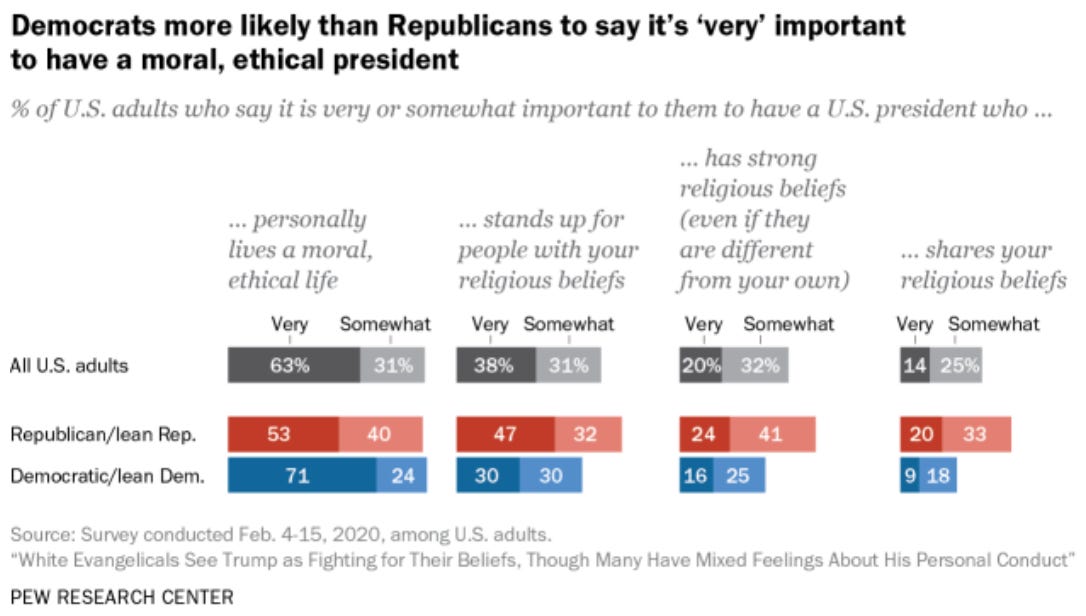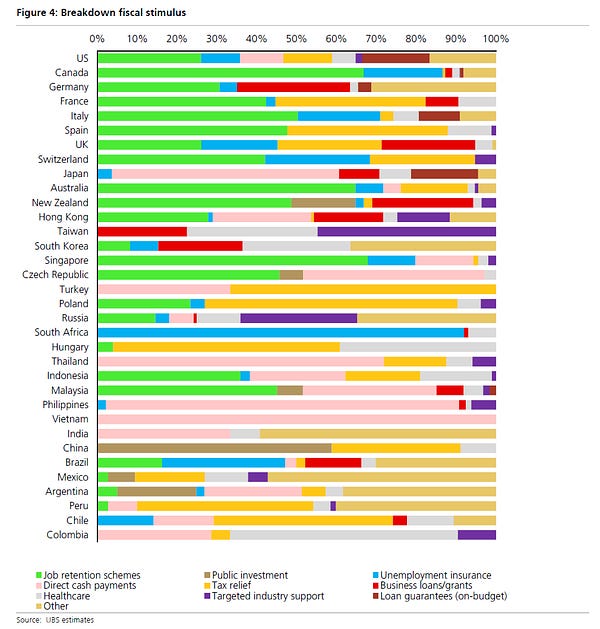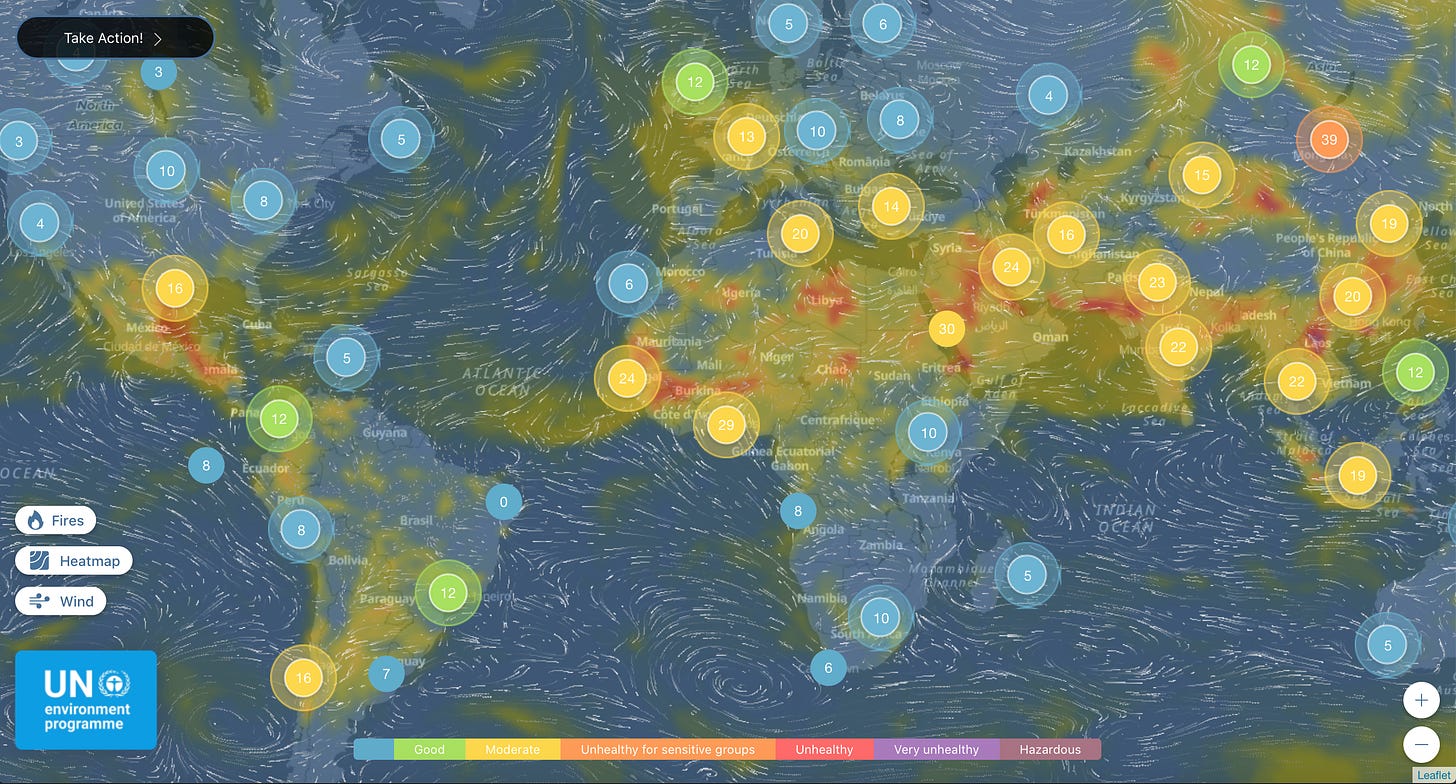Headliners:
Live Event Tonight @ 7:30 pm ET: Front Row at the Trump Show: A Conversation with ABC News’ Jonathan Karl. Register here
Please forward. Sending this to 5 people you think would like it is the best way to help me get the word out. Thank you.
Like the newsletter? Why not sign up for a paid subscription… During this two-week trial, you get the Founding Member Rate — 50% off the regular cost. Continued thanks to everyone who already has done so!
The World
About 4.4 million Americans applied for jobless benefits in the week ended April 18, the Labor Department said Thursday. Since the widespread shutdowns in mid-March, workers have filed more than 26 million unemployment insurance claims. Meanwhile, Sen. Mitch McConnell says he favors letting states declare bankruptcy. (Wall Street Journal, Bloomberg)
Big U.S. banks are preparing to flood loan applications into the government’s emergency financing program for small businesses the moment Congress replenishes it with $320 billion in additional funding. The pressure is particularly high on Wells Fargo & Co. and Bank of America Corp. after they lagged behind smaller rivals in helping legions of business customers tap the Paycheck Protection Program’s initial $349 billion in funding. Further, some of the nation’s biggest banks, including JPMorgan Chase, Citibank and U.S. Bank, prioritized the applications of their wealthiest clients before turning to other loan seekers. (Bloomberg, New York Times)
Elite colleges back away from rescue cash amid criticism of endowments. Stanford University is withdrawing an application for $7.4 million. Harvard University is rejecting its $8.7 million share. Princeton said no to $2.4 million. MIT is contemplating whether it will apply for funds, Duke University has not yet accepted the money and Rice University is in discussions about how it would use its funds. (Politico)
Oil majors and commodity traders are paying up to six times normal rates to store surplus crude in supertankers at sea as they try to cope with an unprecedented global glut. (The Times)
Europe faces the most poisonous North-South showdown since the creation of monetary union. “Social cohesion between European countries is being stretched to the point where the resiliency of the EU and the euro can no longer be taken for granted. The risk is greater now than at any previous time,” says Citigroup’s Arnaud Marès, a former European Central Bank leader. (The Telegraph)
Coronavirus outbreaks at dozens of meatpacking plants across the nation is far more extensive than previously thought, according to an exclusive review of cases by USA TODAY and the Midwest Center for Investigative Reporting. Existing shutdowns include a Smithfield Foods pork processing facility in Sioux Falls, S.D.; a JBS pork plant in Worthington, Minn.; Tyson Foods’ largest pork plant, in Waterloo, Iowa; and another Tyson facility in Logansport, Ind. (USA Today, Finance 202)
Delta, which owns 49% of the Virgin Atlantic, has ruled out injecting fresh cash into the crisis-hit airline. Meanwhile, Ryanair planes won’t fly again if the airline is forced to leave the middle seat empty to comply with “idiotic” in-flight social distancing rules, said CEO Michael O’Leary. (The Telegraph, The Guardian)
Public confidence in Vladimir Putin’s administration is showing signs of decline. Levada Center, Russia’s last independent pollster, said that Putin’s approval rate fell to 63% in March, the lowest since November 2013. (Thakoni)
China’s US ambassador Cui Tiankai took a veiled swipe at Donald Trump for politicising outbreak. Ambassador Cui says little attention is being paid to scientists while politicians are preoccupied with ‘groundless accusations.’ The Ambassador also defended Beijing’s handling of the disease. (South China Morning Post)
China, Singapore & Harvard researchers analyze the cost-effectiveness of antiepidemic measures for COVID-19 and conclude that strong enforcement at the early stage is the only opportunity to maximize both antiepidemic effectiveness and cost-effectiveness. (Research Gate)
Divisions are growing in the U.S. between some governors and mayors over reopening their states. In Las Vegas, Mayor Carolyn Goodman suggests using the city as a “control group” to study the effects of easing restrictions. "We’ll find out the facts afterward,” Goodman said. (Los Angeles Times, Washington Post)
The economic and political impact of the coronavirus crisis is beginning to reverberate across the presidential battleground states, creating unforeseen red-state opportunities for Joe Biden but also offering promise for President Donald Trump in several Democratic-leaning states where his prospects once seemed limited. Meanwhile, a new Ipsos Poll signals strengthening support for Biden over Trump in three Midwest battleground states. (Politico, Reuters)
Ethics & Politics (Pew Research Center)

Finance
Social Security costs are expected to exceed total income in 2021, and now the Trustees expect reserves to be depleted by 2035 as coronavirus weights on the system’s financial condition. (Wall Street Journal)
Confidence among European businesses and consumers is in a free fall. Figures on Thursday showed French business confidence plunged to its lowest on record in April with economic activity running 35% below normal levels, while consumer sentiment in Germany also dropped to a record low. (Bloomberg)
Hedge funds have suffered their worst quarterly outflows since 2009 as investors flee amid market volatility and coronavirus uncertainty. (Financial Times)
Private-equity firm Sycamore Partners wants to scrap its plans to take control of Victoria’s Secret, a high-profile legal test of whether the coronavirus pandemic allows a buyer to walk away from an agreement reached before the outbreak. The investor said the lingerie brand’s decision to close U.S. stores, furlough the majority of its workers and skip April rent payments were violations of the proposed transaction. (Wall Street Journal)
More than half of drinkers, diners and gym-goers are reluctant to return to normal life after the lockdown - fuelling fears of a lengthy economic downturn as scared consumers refuse to spend, a new UK poll shows. (The Telegraph)
Nobel Prize winning economist Paul Romer outlines a “Roadmap to Responsibly Open America,” proposing a comprehensive “test and isolate” policy, making it safe for Americans to return to work and keeping the infection rate below 5% of the population. (Paul Romer)


Technology
Jeff Bezos takes back the wheel at Amazon: The chief executive, who had distanced himself from day-to-day management, is closely involved in the company’s response to the pandemic. He is holding daily calls to help make decisions about inventory and testing, as well as how and when — down to the minute — Amazon responds to public criticism. And in April, for the first time in years, he made a publicized visit to one of Amazon’s warehouses. (New York Times)
Bluetooth is at the heart of contact-tracing apps designed to show whether you might have been exposed to coronavirus. However, getting accurate measurements from Bluetooth signals is a very hard problem. Many things can mess it up and make the data incorrect—for example, whether your phone is horizontal or vertical. To overcome it: Engineers will need to take more data into account, for example from other phone sensors, and learn more about how to properly interpret signals. (MIT Technology Review)
China’s central bank has accelerated the testing of its new sovereign digital currency and, for the first time, will include some foreign consumer brands in the programme. American chains Starbucks, McDonald’s and Subway were named on the People’s Bank of China (PBOC)’s list of firms that will test the digital currency in small transactions with 19 local businesses. (South China Morning Post)
Smart Links
Zoom daily users surge to 300 million despite privacy woes. (Bloomberg)
First-ever comprehensive geologic map of the moon. (Science Daily)
California Highway Patrol says tickets for speeding in excess of 100 mph have surged 87%. (Los Angeles Times)
Harvard professor reaps 17,000% return on early coronavirus vaccine bet. (Bloomberg)
Yale donates $250,000 to buy laptops for online-learning students. (New Haven Register)
China wants to resume basketball season. (Los Angeles Times)
Good News
Air quality dramatically improved in nine major cities across the globe as people shelter in their homes, a new report finds. The report pulls together government data from Delhi, London, Los Angeles, Milan, Mumbai, New York City, São Paulo, Seoul, Wuhan, and Rome. (The Verge)
IQAir offers an interactive map (IQAir):

Here is a list of 50 environmental victories in the half century since Earth Day began. (National Geographic)
Online reruns of concerts, sports provide solace. (Wall Street Journal)


Thanks for reading. Did you like the newsletter? Why not subscribe now?


